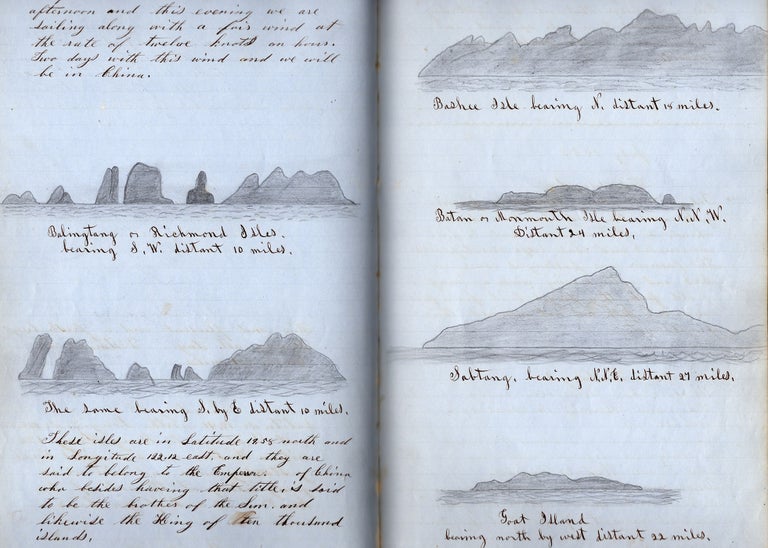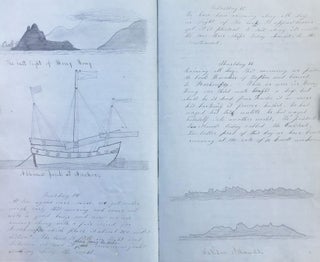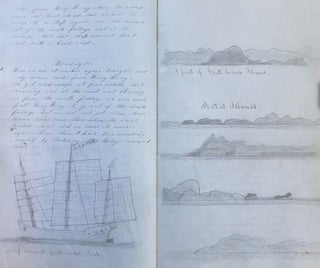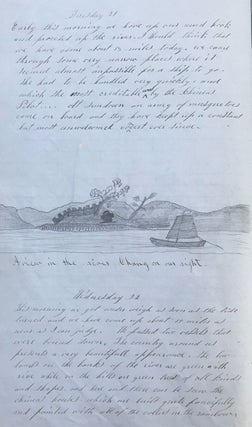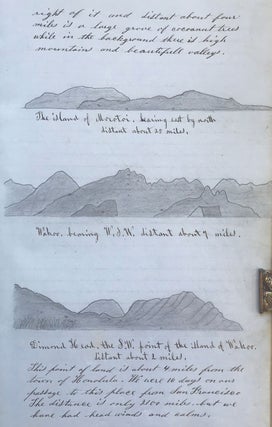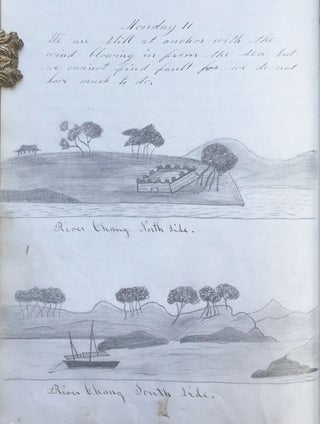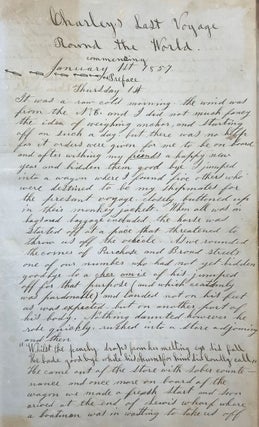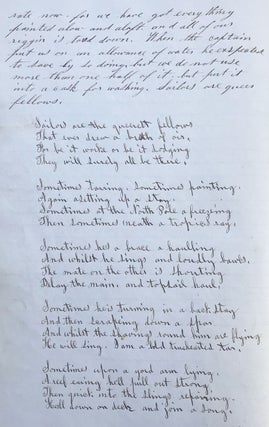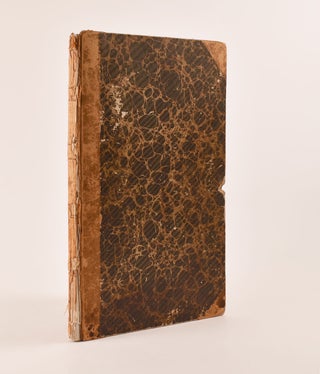Charley’s Last Voyage Round the World. Commencing January 1st 1857.
Boston, San Francisco, Honolulu, Hong Kong, Foochow, and other locales, 1 Jan.–22 Sept. 1857. 4to (13.75” x 8.5”), three-quarter calf with marbled paper over boards. 103 pp. of manuscript. 32 pencil illustrations interspersed between entries. Numerous excised sections of leaves at the end, one section affecting the text. Newspaper clipping affixed to front pastedown. CONDITION: Good, losses to spine but intact, one leaf with a 5” tear and one leaf with a 10.5” tear along margin but no losses to the text, the final two pages fair with losses to words. A fascinating journal recording a voyage to China, including thirty-two original illustrations and many interesting sailor-themed verses. Little is known about Charles, the author of this volume, other than that after being imprisoned in Hawaii for an event that occurred while he was on a whaling ship, he switched to sailing aboard merchant vessels. The journal begins with Charles boarding the Charger for its maiden voyage under Capt. Luther Hurd, and sailing from Boston for San Francisco on 4 January 1857. On the way, the Charger races the vessel Stag Hound, aboard which Charles will subsequently travel to China. In addition to his fellow Americans, the thirty men on the Charger include Englishmen, Irishmen, Scotsmen, Dutchmen, an Italian boy named Jimmey Ducks, “a boy that weighs 219 pounds” though he is “only 16 years of age,” and one Jim Crow, who “would make a horse smile to hear him singing comic songs and spouting Shakespeare &c.” By 7 March, they have successfully rounded Cape Horn—a “wild and fearful spot” which he describes at some length. Charles writes verses to celebrate their successful passage: “To the fatal spot I bid farewell / Where many before had been / And who with eager staring eyes / These dreaded rocks had seen…” Events on the vessel often inspire Charles to pen nautical-themed verses and poems such as “The Dying Sailor.” While some of these poems are likely his own creation, others were probably in the oral tradition of sailors. In one poem, he writes: “Sailors are the queerest fellows / That ever drew a breath of air…Sometimes he is turning in a back stay / And then scraping down a spar / And whilst the shavings round him are flying / He will sing, I am a bold truehearted tar.” After seeing Albatrosses for the first time, he records a poem called “To the Albatross” written by “a chum” on the occasion: “Plumed bird of the southern clime / Thou art noble daring free…” In one later instance he dresses and cooks an Albatross for dinner. The Charger arrives in San Francisco on 8 May after a passage of 124 days. On 12 May, Charles leaves San Francisco, along with 380 Chinese passengers, on the ship Stag Hound under Capt. Peterson, bound first for Honolulu (a sixteen-day passage) and then for Hong Kong. In China, Charles notes the ship’s trade activities and writes sketches of the scenes and locales he visits. Upon his arrival in Hong Kong, he visits a temple and describes the religious iconography he observes. The Stag Hound, meanwhile, takes in twenty cases of opium and 45,000 dollars in silver to be delivered at Foochow (Fuzhou), China, as well as 12,000 boxes of fire crackers. With the help of a Chinese pilot, they navigate the River Chang and reach Foochow on 23 July, where they take in “25540 boxes of tea. 75 bales of silk. 3000 boxes of fire crackers and 1000 rolls of fancy matting”—“The ship is loaded now and we are homeward bound.” Before leaving Foochow, Charles also visits a pagoda: “What it is intended for I do not know but I expect that it has something to do with the Chinese religion. But it is no use to ask them anything about it for all that can be got from them about it is—No sorry John.…at last we all arrived at the top, and we were amply paid for our trouble for we could see for miles and miles over the country.” Charles’s illustrations depict Hawaii, Cape Horn, Hong Kong, scenes along the River Chang, islands, profiles of the shore, an island in Hong Kong harbor, and three Chinese “junk” vessels. In addition to quotidian activities like repairing, rigging, carpentry, scraping, painting the ship, and cleaning, Charles records and comments on the more unusual elements of his life at sea: concerts the crew puts on; deaths at sea and the resulting services; a pig falling overboard; celebrating George Washington’s birthday; the punishment of crew members; seeing the ghost of a recently deceased sailor at night, and so forth. As his fellow ship-mates become increasingly “quarrelsome,” he also notes a substantial amount of inter-crew violence, one instance involving a much-disliked cook on the Charger. It is unclear whether this voyage was in fact Charles’s final journey, as his title suggests. The journal concludes during Stag Hound’s voyage back to America due to the missing leaves. SOME REPRESENTATIVE PASSAGES Boston; 1 Jan. 1857 “It was a raw cold morning. The wind was from the N.E. and I did not much fancy the idea of weighing anchor, and starting off on such a day but there was no help for it. Orders were given for me to be on board and after wishing my friends a happy new year and bidden them goodbye I jumped into a wagon where I found five others who were destined to be my shipmates for the present voyage closely buttoned up in their jackets.…soon arrived at the end of Lewis wharf where a boatman was in waiting to take us off to our ship which was laying in the stream. All in the boat was shoved off and after several narrow escapes from capsizing we came alongside the ship and clambered up her side.…everything was in a mess and the mate… put to right ready for sailing with the first fair wind to San Francisco. This ship (the Charger) is a new one and a splendid ship she is too. She is 201 feet long 39 feet beam and 23 depth of hold.” 2 Jan. “Today the mate called all hands aft and set the watches. I was chosen in the mate’s watch. There is fourteen in each watch men and boys.” 3 Jan. “I learnt today that we are going to run a race out to San Francisco with the ship Stag Hound she is laying a short distance from us.” 4 Jan. “At 2 PM the steam tug Enock Train came off to us bringing the Captain’s wife and another lady. They are going out passengers with us to San Francisco. At 3 PM we got under weigh with a strong breeze blowing from the N.W. in company with the Stag Hound. The wind increased as we sailed down the bay and when we came abreast of Boston Light we doubled reefed our topsails.” 8 Jan. “Since we left Boston we have been running from 12 to 14 knots an hour. This afternoon all hands were rounded out to shorten sail as the wind commenced to pipe up again.” 10 Jan. “The crew are in fine spirits now as the weather is more Christian like than it has been since we left port. Our officers are very strict with us every night they have kept us aft (in our watch on deck) by the cabin doors. We have been allowed to go forward of the main mast but we must stand in the waters up to our knees and every few minutes a big sea will come in on top of us and then we have to wade about the decks and pick up the firewood or whatever else gets adrift. Who wouldn’t sell a farm and go to sea.” 11 Jan. “We exchanged signals with a Prussian bark she was bound to the northward. This is the first vessel that we have seen.” 18 Jan. “Today the Captain brought foreword a lot of tracts and distributed them among us. Eight of our pigs have died since we left port.” 25 Jan. “Our officers seam to believe in the eleventh commandment which says sailors six days shalt thou labor and do all thou art able and on the seventh thou shall holystone the deck and scrub the cable.” 29 Jan. “We caught a shark today and had some of it cooked for supper. It was the best meal that I have had for this long time.” 5 Feb. “We passed several Catamarans today, they are composed of several logs lashed together. Have one large sail and they will sail quite fast each one of them is manned by two Indians. I suppose that they were out here for the purpose of catching fish.” 8 Feb. “The Captain brought another lot of tracts forward this afternoon. I begin to think that he is not quite so good as he tries to make people think he is.” 11 Feb. “The Captain and mate had a dispute today and nearly came to blows. They called each other liars and almost every other bad name that they could think of. But this evening they are as good friends as ever they were.” 14 Feb. “The mate put one of our crew in irons for stealing a pair of shoes from the cargo. The mate has got the man standing by the main mast with a board hung to his neck and the word thief painted on it in large red letters.” 22 Feb. “Today being the birth day of Washington we felt ourselves in duty bound to celebrate the anniversary and we did so in true sailor style that is after arguing upon the matter all day night came on without us having arrived at any definite conclusion. One of our numbers however volunteered to make a speech. He was conducted aft with great ceremony, mounted the capstone where after sundrey hems and haws he done the same as the most of public speakers do on such occasions.…Captain Hurd with his liberality presented us very kindly with some spruce beer.” 7 Mar. “Cape Horn. We arrived off this fair famed and much dreaded spot early this morning…I looked upon it. Melancholy thoughts crowed upon my mind as I thought of many a bright and daring spirit up here met his fate and how anxious hearts at home were praying for the return of the wanderer. It is indeed a wild and fearful sport.…the sea rises to an enormous height. Most terrible squalls come flying by, shrieking, whistling wildly. The ship careens to the blast.…the moaning of the wind, the shrill cry of the albatross. These are her funeral dirge, her requiem.” 9 Mar. “This forenoon a whale ship came close to us with the intention of speaking but just as she had got within speaking distance a heavy squall came down on us.” 11 Mar. “Luther Hurd…is a man about 45 years of age with sandy complexion, grey eyes, fox colored hair and mammoth nose. He belongs to Eastham Cape Cod and he is a hypocrite. When he is on shore he is considered to be a fine religious man. He makes speeches in meetings and is thought to be a pious man. But at sea he is altogether different. I find that he can lie and swear as well as the next one.” 21 Mar. “The bosen caught an Albatross this morning and I went to work and dressed it and had it cooked for supper. It measured 12 feet from the tip of one wing to the tip of the other.” 24 Apr. “Everybody is getting quarrelsome from the Captain to the smallest boy on board of the ship. This afternoon the Captain told our lady passenger that he would slap her face if he caught her speaking to the mate again. That’s a fine expression for a righteous man to make. There will be some queer times when we get to San Francisco.” San Francisco; 8 May “There has just been quite a rumpus on board. One of our crew (who a long time ago swore vengeance against the cook) has just been into the gally and pounded the poor devil nearly to death but there is no one on board who pitties him for he has caused a good deal of trouble among the crew and officers. The mate told us that the man who done it served him just right.…We are at anchor in the long wished for harbor of San Francisco. As we came up the bay of the ship was crowded with boarding house runners and newspaper reporters.” San Francisco; 10 May “Today I have been cruising about the city seeing the sights. There is some very handsome buildings.” 11 May “Today we were paid off from the Charger but the old sinner would not pay us our full wages. He told us that that he would give us so much and we might take it or get a lawyer and sue him for our wages, and after having a confab among ourselves we came to the conclusion that it was best to take what he offered us.…This evening…the passengers that came out in the ship went to him and accused him of ill treatment to his sister and struck him a blow that laid him sprawling on the wharf where he was standing. Whenever our crew see him in the streets they are hooting him and throwing stones at him.” 12 May “Today I have shipped again in the ship Stag Hound, Captain Peterson. She is bound from this place to Honolulu and thence to Hong Kong. From these I expect that she will go to Europe or the United States. She takes Chinese passengers to Hong Kong.” 13 May “It has been very pleasant today and I have passed the time in strolling about the wharfs looking at the clipper ships that are laying here. There is some very handsome ones, among them are the Hurricane, Comet, Kate Hooper, Stars of Hope, Wild Roves and Defender.” 16 May “Among our passengers there is one man that I know very well but he does not know me yet. In 1852 he was counsel at Honolulu and he was kind enough to have me confined in the fort at that place and kept on bread and water for nineteen days.… I had shipped in the whale ship Hobomok at Hong Kong about two months before and at the time I joined her the Captain promised to discharge me at the first port that he went into. We had been out from Hong Kong about six weeks when we got dismustered[?] and went into the port of Honolulu to get repaired, then I claimed my discharge but the Captain refused to give it to me then I refused to work and the counsel had me put in the fort and kept there until the ship was ready for sea again. When I was put in irons and taken on board and stowed away in the room where I was kept for two weeks or more without seeing daylight when the ship put into the islands again and I got my discharge. Since then I have been sailing in merchant vessels.” 21 May “We have about 380 Chinese passengers and they are the greatest gamblers that I ever fell in with for they are gambling day and night all the time except when they are eating their grub which consists of a little rice twice a day.” 24 May “Two cooks are Chinese and a dirtier set I never saw. Before the mast we have a sprinkling of all nations. It would puzzle a Philadelphia lawyer to understand one half of them. I don’t believe that there was one half of the confusion at the building of the tower of Babel as there is…at meal times.” Honolulu; 31 May “About 8 O’clock this morning we arrived off of this town and commenced to load and fire our big guns to bring some boats off to us, but it was nearly noon before any of them got alongside of us.… The town of Honolulu presents a charming appearance from the sea. On the right of it and distant about four miles is a large grove of coconut trees while in the background there is high mountains and beautiful valleys.” 6 June “This forenoon there was quite a row among the Chinamen but I could not learn the cause of it. The first that I saw of it was one Chinamen in chase of two others with an ax and he was just ready to strike one of them when he was caught by our second mate.” 25 June “There are lots of pirates now in these seas but we do not fear them so much as we do our passengers for it is a common thing for them to try and take the vessel that they are in when they find that they are near to China.” Hong Kong; 7 July “Today our Captain gave us liberty to go on shore…I stayed long enough to visit the Josh[?] Temple…As we entered the building one of the images that they worshiped [sic] stood on our right, a large gong hanging on the wall kept it company. To our left stood a large number of spears in a rack looking defiance to all heathen intruders. Facing us were four images and which seamed to be the principal ones by the large number of worshippers. Among them I noticed some of our passengers, who were offering incense to the gods in the shape of roast pork, chickens &c. They seemed to be very sincere in their devotions by their prostrating themselves to the ground and knocking their heads &c. There are no windows to the Temple but it is lit up with candles quite fancifully…There are several other rooms opening from the main one, each of which contain different kinds of images some of them are good looking while others are quite the reverse. The new Governor of Hong Kong arrived here this afternoon and was saluted by all of the men of war in the harbor.” 10 July “We have to keep watch at night here for fear of the Chinese they have been boarding vessels lately at night and murdering whoever they found on board.” 20 July “A short distance from where we are now laying lies the wreck of the ship Wild Duck. She left Foochow about two weeks ago but ran ashore at this place and before the crew could make their escape in their boats seven of them were killed by the Chinese. We have seen a number if men of war junks today they are painted with all kinds of colors with large eyes on their bows so that they can see at least that is what the Chinese say they are for.” Foochow; 23 July “I got very much disappointed in this place. I expect to see a large city with fine buildings but instead of that the city of Foochou lays about five miles further up the river, but there is a fine island within a quarter of a mile of us with a large Pagoda upon it which I intend to visit the first chance I get.” 25 July “I saw another ghost last night. About 11 O’clock something put it into my head to try and catch some fish to pass the night away and I went and got a line that belonged to the old Dutchman that died on the 17th of this month and after I had baited the hook and was sitting on the ship’s rail waiting for the fish to bite I commenced to think about the old Dutchman and I was just saying to myself what if I should pull him up instead of a fish when I happened to look down to the water and I saw a dead body not more than a foot from the line. And I thought that the old Dutchman had surely come for his line.” 30 July “We took in 3848 boxes of tea today.” 6 Aug. “The ship is loaded now and we are homeward bound. Our cargo consists of 25540 boxes of tea. 75 bales of silk. 3000 boxes of fire crackers and 1000 rolls of fancy matting.” 11 Aug. “Our crew had quite a concert this evening we have got two Chinese drums and two flutes on board. Jim Crow was in his glory.” 14 Aug. “Tonight the island of Formosa is in sight. This island is 225 miles long and about 80 wide. It is inhabited by a race of people similar to the Chinese called Formosians there are three different towns on this island.” 17 Aug. “For a sailor would as soon see his Satanic Majesty on board of his ship as a cat. For to him a cat is linked with superstition and superstition with a cat. Of all the world no one loves a cat like an old maid, it is her only idol.” 27 Aug. “We have seen about eighteen small islands today belonging to the Philippines Group. They are inhabited by natives and are called Tagals.” 7 Sept. “This has been an unlucky day for us…We had a typhoon which blew away nearly a whole suit of sails.…The Captain’s wife and daughters crying and wringing their hands. Our passengers are as pale as half a dozen ghosts. The officers giving a dozen orders at once but our second mate acted more like a fool than he did like a man. He was running about from one part of the ship to another with a fish horn (I suppose he called it a speaking trumpet). He would run up to our crew and put his trumpet close up to their ears and bellow forth something that nobody could understand. But where was Charley all this time? He and old Carl the Dutchman were out on the flying jibboom trying to furl the jib topsail with his cap blown overboard and his shirt blown over his head.” An interesting illustrated China trade journal with detailed inventory records as well as colorful descriptions of life on the vessel and on shore.
Item #7709
Sold


